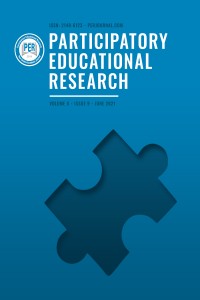Research Article
Year 2022,
Volume: 9 Issue: 1, 150 - 172, 01.01.2022
Abstract
References
- Allen, K. A. & Bowles, T. (2012). Belonging as a Guiding Principle in the Education of Adolescents. Australian Journal of Educational & Developmental Psychology, 12, 108-119.
- Alptekin, D. (2011). Toplumsal aidiyet ve gençlik: Üniversite gençliğinin aidiyeti üzerine sosyolojik bir araştırma (Social belonging and youth: A sociological research on the belonging of university youth]. Unpublished Doctorate Thesis, Selçuk University, Konya.
- Atak, H. (2011). Kimlik gelişimi ve kimlik biçimlenmesi: Kuramsal bir değerlendirme [Identity development and identity formation: A theoretical evaluation]. Current Approaches in Psychiatry, 3(1), 163-213.
- Bechhofer, F. & McCrone D. (2012). Imagining the nation: Symbols of national culture in England and Scotland. Ethnicities, 13(5) 544–564. https://doi.org/10.1177/1468796812469501. DOI: 10.1177/1468796812469501.
- Bhugra, D. & Becker, M. A. (2005). Migration, cultural bereavement and cultural identity. World Psychiatry, 4(1), 18-24.
Examination of Turkish Middle School Students’ National Belonging Levels in Terms of Different Variables
Abstract
The purpose of this study was to determine middle school students’ national belonging levels in terms of different variables. In this quantitative study, middle school students’ views on national belonging were determined by the “National Belonging Scale for Middle School Students”. The study was conducted with 1318 middle school students in Niğde province of Turkey during the Spring term of the 2019-2020 academic year. Research data were collected through “National Belonging Scale for Middle School Students” and were analysed with SPSS 24 software package. According to the study results, middle school students had a high positive view of their national belonging. Their gender did not make a statistical difference in terms of both reasons and results of their national belonging. On the other hand, students’ views on national belonging differed in terms of their grade level. Again, although there was no difference between the public and private schools in terms of reasons of their national belonging, there was a statistically significant difference between them in terms of the results of their national belonging in favor of the public school. Another difference was determined between Turkish and refugee students’ national belonging. Turkish students’ mean scores of reasons and results of their national belonging were statistically higher than the refugee students’ mean scores. Considering national belonging in terms of each variable, middle school students’ national belonging can be strengthened with some activities that can be done within the scope of the implicit program as well as the educational activities carried out within the curriculum at schools. Social Studies is the most important course into which works on this subject can be integrated.
References
- Allen, K. A. & Bowles, T. (2012). Belonging as a Guiding Principle in the Education of Adolescents. Australian Journal of Educational & Developmental Psychology, 12, 108-119.
- Alptekin, D. (2011). Toplumsal aidiyet ve gençlik: Üniversite gençliğinin aidiyeti üzerine sosyolojik bir araştırma (Social belonging and youth: A sociological research on the belonging of university youth]. Unpublished Doctorate Thesis, Selçuk University, Konya.
- Atak, H. (2011). Kimlik gelişimi ve kimlik biçimlenmesi: Kuramsal bir değerlendirme [Identity development and identity formation: A theoretical evaluation]. Current Approaches in Psychiatry, 3(1), 163-213.
- Bechhofer, F. & McCrone D. (2012). Imagining the nation: Symbols of national culture in England and Scotland. Ethnicities, 13(5) 544–564. https://doi.org/10.1177/1468796812469501. DOI: 10.1177/1468796812469501.
- Bhugra, D. & Becker, M. A. (2005). Migration, cultural bereavement and cultural identity. World Psychiatry, 4(1), 18-24.
There are 5 citations in total.
Details
| Primary Language | English |
|---|---|
| Subjects | Other Fields of Education |
| Journal Section | Research Articles |
| Authors | |
| Publication Date | January 1, 2022 |
| Acceptance Date | July 12, 2021 |
| Published in Issue | Year 2022 Volume: 9 Issue: 1 |


